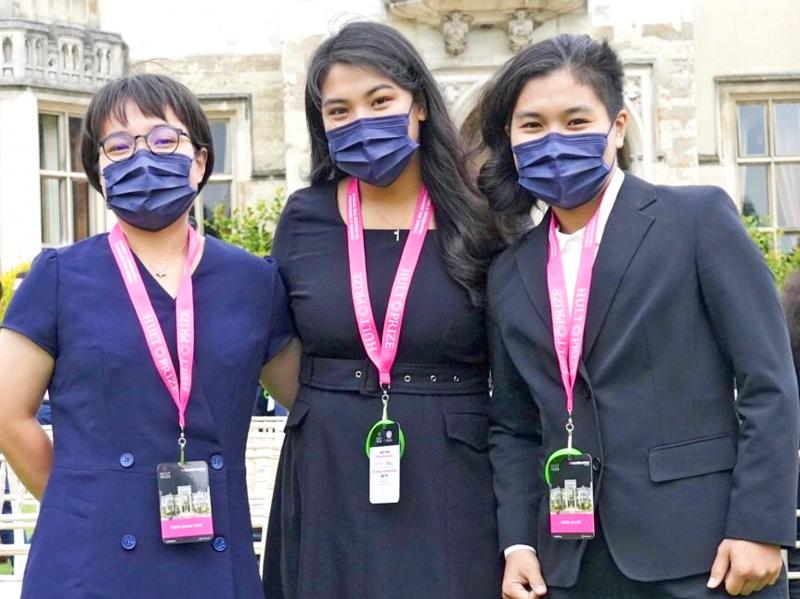A team from National Taiwan University (NTU) is in the UK with 30 teams from around the world to compete in this year’s Hult Prize Challenge, with the top prize being a US$1 million start-up fund.
NTU’s “interWellness” team — consisting of students Joyce Chen (陳敏而), Sandy Tsai (蔡岑珊) and Lin Fang-ju (林芳如) — won a regional challenge in April to represent Taiwan at the competition.
The Hult Prize Challenge is an annual competition that crowd-sources ideas from university students to solve a pressing social issue.

Photo courtesy of Joyce Chen
With the theme of “Food for Good,” the goal of this year’s challenge is to create jobs, stimulate economies, reimagine supply chains and improve outcomes for 10 million people by 2030, the organizers said.
The team is using the challenge as an important learning opportunity and a chance to do things that are “meaningful and impactful” for the world, said Chen, a second-generation Taiwanese-American.
Chen said that interWellness is a platform that enlists the help of nutritionists and chefs to offer diet-friendly meals to people with chronic kidney disease.
After repeatedly updating their business model, the team registered interWellness as a company in Taipei and opened for business a week ago, Chen added.
The team is one of 30 that qualified to participate in the Hult Prize this year after 30,000 teams participated in the preliminary round.
The 30 teams are in the UK, participating in a five-week global accelerator program. At the end, only six teams will move on to the finals, with the winning team to receive US$1 million in seed capital next month.
During the accelerator program, the 30 teams are being housed at an English castle, Chen said.
As well as preparing for the challenge, the team has made trademark Taiwanese snacks — pineapple cakes and cream puffs — to give to the other teams and promote Taiwanese culture, she said.
Chen said that her Taiwanese parents raised her in Fremont, California, but that she came to Taiwan to study at NTU four years ago.
The decision was “one of the best decisions I ever made,” she said, adding that it also improved her Chinese-language skills.
“Now I can read books in Chinese, and be closer to my friends and relatives in Taiwan,” she said.

Eight restaurants in Taiwan yesterday secured a one-star rating from the Michelin Guide Taiwan for the first time, while three one-star restaurants from last year’s edition were promoted to two stars. Forty-three restaurants were awarded one star this year, including 34 in Taipei, five in Taichung and four in Kaohsiung. Hosu (好嶼), Chuan Ya (川雅), Sushi Kajin (鮨嘉仁), aMaze (心宴), La Vie by Thomas Buhner, Yuan Yi (元一) and Frassi in Taipei and Front House (方蒔) in Kaohsiung received a one-star rating for the first time. Hosu is known for innovative Taiwanese dishes, while Chuan Ya serves Sichuan cuisine and aMaze specializes

STATS: Taiwan’s average life expectancy of 80.77 years was lower than that of Japan, Singapore and South Korea, but higher than in China, Malaysia and Indonesia Taiwan’s average life expectancy last year increased to 80.77 years, but was still not back to its pre-COVID-19 pandemic peak of 81.32 years in 2020, the Ministry of the Interior said yesterday. The average life expectancy last year increased the 0.54 years from 2023, the ministry said in a statement. For men and women, the average life expectancy last year was 77.42 years and 84.30 years respectively, up 0.48 years and 0.56 years from the previous year. Taiwan’s average life expectancy peaked at 81.32 years in 2020, as the nation was relatively unaffected by the pandemic that year. The metric

Taiwan High Speed Rail Corp. (THSRC) plans to ease strained capacity during peak hours by introducing new fare rules restricting passengers traveling without reserved seats in 2026, company Chairman Shih Che (史哲) said Wednesday. THSRC needs to tackle its capacity issue because there have been several occasions where passengers holding tickets with reserved seats did not make it onto their train in stations packed with individuals traveling without a reserved seat, Shih told reporters in a joint interview in Taipei. Non-reserved seats allow travelers maximum flexibility, but it has led to issues relating to quality of service and safety concerns, especially during

A magnitude 5.1 earthquake struck Chiayi County at 4:37pm today, the Central Weather Administration (CWA) said. The hypocenter was 36.3km southeast of Chiayi County Hall at a depth of 10.4km, CWA data showed. There were no immediate reports of damage resulting from the quake. The intensity of the quake, which gauges the actual effect of a seismic event, measured 4 in Chiayi County, Tainan and Kaohsiung on Taiwan's seven-tier intensity scale, the data showed. The quake had an intensity of 3 in Chiayi City and Yunlin County, while it was measured as 2 in Pingtung, Taitung, Hualien, Changhua, Nantou and Penghu counties, the data